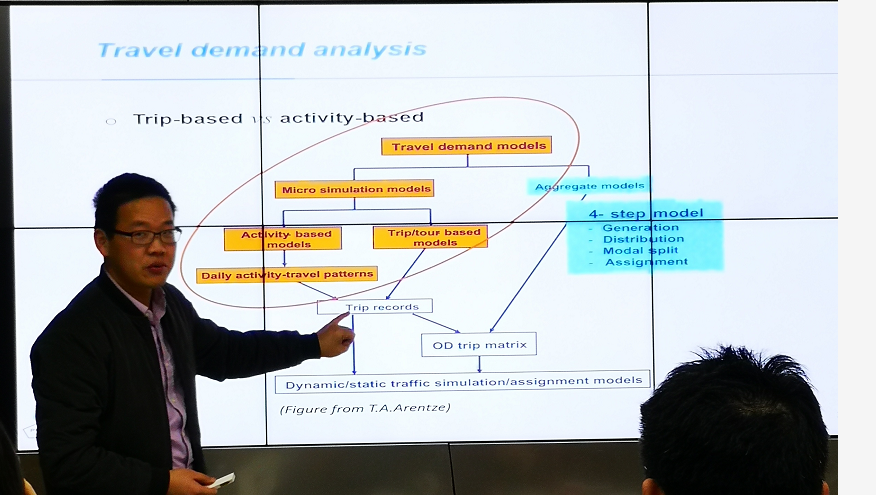Dr.Feixiong Liao from Eindhoven University of Technology visited BUAA SEM and gave a seminar, “Recent progress in multi-state supernetwork modeling for travel demand analysis”, on 19th December, 2018. Prof. Qiong Tian chaired this seminar. Other participants were Prof. Tian-Liang Liu, Prof. Chen-Lan Wang and postgraduate students of SEM.

This talk includes three model extensions developed with co-workers centered at multi-state supernetwork modeling for travel demand analysis. Motivated by the potentially large share of shared autonomous vehicles (SAVs) in the nearfuture, with the first topic, Dr. Liao concerned an activity-based bi-levelsystem optimal model inclusive of a hub-based relocation strategy to moderatethe supply and demand of SAVs, in which the lower-level captures the travelers’activity-travel scheduling behavior by a tolerance-based dynamic activity-travel assignment (DATA) model and the upper-level determines the fleet size, initial distribution, and hubs of SAVs. To address the difficulty of scalability in the family of DATA models, with the second topic, Dr. Liao discussedan improved column generation algorithm for speeding-up DATA. The algorithm adopts a varied temporal resolution scheme, combining exploration and exploitation strategies, to assign flows to narrow time regions rather than to the whole time horizon. The third model extension is about a new framework of dynamical activity-travel rational adjustment processin multi-state supernetworks based on a needs-based theory. This formalism couples dynamic activity generation, activity-travel scheduling, and traffic flow evolution in a strong sense, and offers appealing explanations for day-to-day traffic dynamics and equilibria.
After Dr. Liao’s talk, he answered teachers’ and students’ questions. This seminar is fruitful, and will be helpful for our modeling of transportation problem in the future.
Bio:Feixiong Liao is an assistant professor (tenured) at the Urban Planning Groupof Eindhoven University of Technology (TU/e). His fields of expertise include urban planning and transport studies. He received his Ph.D. from TU/e 2013. During his Ph.D. studies, he worked with a large consortium to examine how accessibility in the Netherlands' Randstad region can be improved by implementing synchronization strategies. His current research activities are focused on the developments of a large-scale model system of urban transportation planning.